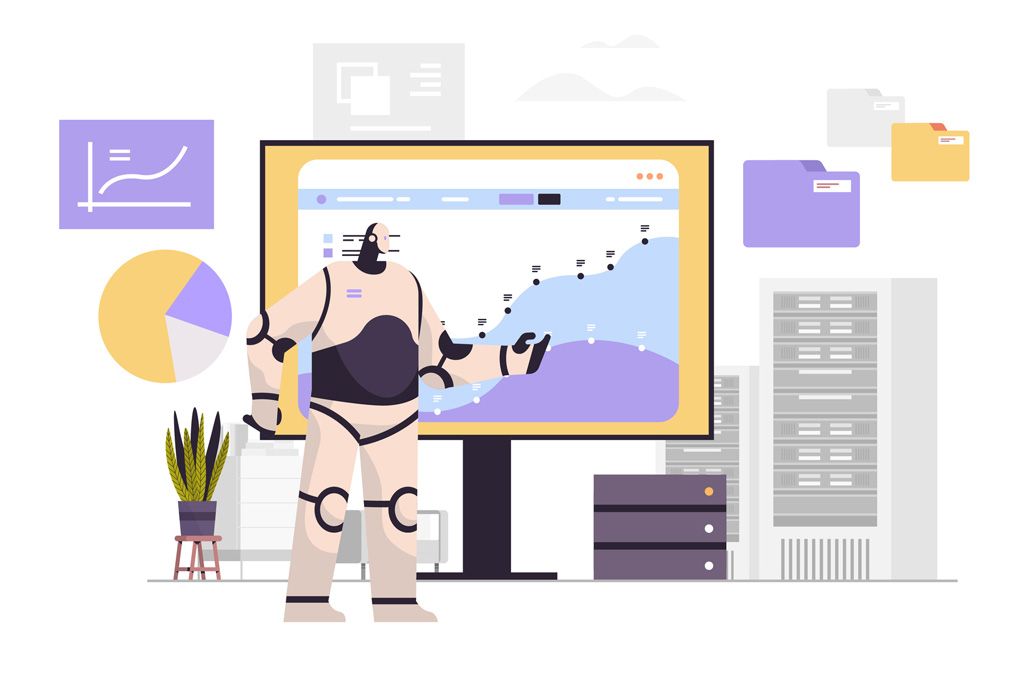What will be the role of AI and Machine Learning in accounting?

In February, we discussed various emerging technologies in accounting, including machine learning and artificial intelligence (AI), and what impact they have on those pursuing a bachelor’s degree in accountancy. Technologies like these have created efficiency and uniformity that make room for accountants to solve problems and better understand the data in front of them.
AI and Machine Learning Explained
IBM defines AI as a field that “combines computer science and robust datasets, to enable problem-solving.” Computers are able to quickly read large amounts of information and find specific insights that help them perform tasks originally only able to be accomplished by humans, such as recognizing and translating meaning and making decisions.
IBM further explains that machine learning is encompassed by AI. Machine learning is a branch of AI that allows software applications to become better, more accurate by utilizing historical data to predict new output values.
Below are just a couple of ways that accountants and other practitioners of accountancy may employ AI and machine learning to make their jobs more efficient and their work more constructive and innovative.
How AI and Machine Learning Help in Identifying and Fighting Fraud
AI and machine learning can constantly work to recognize, defend and even deflect instances of fraud and other illegal activities through automation that examines large volumes of data and identifies outliers as they occur. Examples of fraud and misconduct include false reporting, procurement fraud, payroll fraud, abuse of expense reimbursements, and even money laundering, bribery and other types of corruption.
Forensic accounting is an area of accounting tasked with investigating an organization’s financial records for evidence of misconduct. Historically, this was a lengthy, inefficient process.
“Before the emergence of data analytics, forensic accounting relied heavily on manual processes to sieve out information and evidence to support investigations,” write researchers at Singapore Management University.
Now, as a simple example, machines can review once siloed data pools and find matching and missing/outlier coming and going payments between bank accounts and balance sheets and more. These can help with identifying and fighting fraud by recognizing mismatched data or gaps in accounts. Companies can also quickly ask clients, employees, and customers about purchase and other accounting information shortly after a red flag transaction occurs to check accuracy in real-time.
Streamlining Audits With AI and Machine Learning
Another area of accountancy that is improved by AI and machine learning is the streamlining of audits. AI and Machine Learning can add a level of automation and sophistication that can both sort and moreover understand connections between seemingly disjointed bodies of data.
The technology firm Aspire systems writes of various ways that AI has enabled these processes in auditing, including automation and better compliance with corporate, state, and federal regulations through the monitoring of pertinent documents and raising alerts where necessary. According to Aspire, “Automation enables a reduction of 80-90% of the time previously taken by the workforce in performing disparate and repetitive tasks manually. It also enhances the quality of the output by reducing human error.”
The Accounting Profession as a Whole
There are many other applications of AI in the accounting world, according to Aspire, including: payables and/or receivables processing; supplier onboarding; procurement; understanding cash flows; finding more efficient tax strategies; customer support; and more.
As a consequence of these and many others, accountants can spend more time solving problems that may have taken more time to even identify. Accountants can broaden the understanding of a client or organization’s records using tools like AI, machine learning, and data analytics.
Inspired Futures in Accounting
Students pursuing Boler’s bachelor’s degrees in accountancy become familiar with growing AI and machine learning tools right on campus. In courses like AC456 – Emerging Technologies in Accounting, students are trained in cutting-edge technologies through the lens of the accounting profession, including hands-on components using case studies, allowing students to directly engage with the technologies that are shaping the future of accounting.
JCU is a private Jesuit university located in University Heights, Ohio, near Cleveland.
